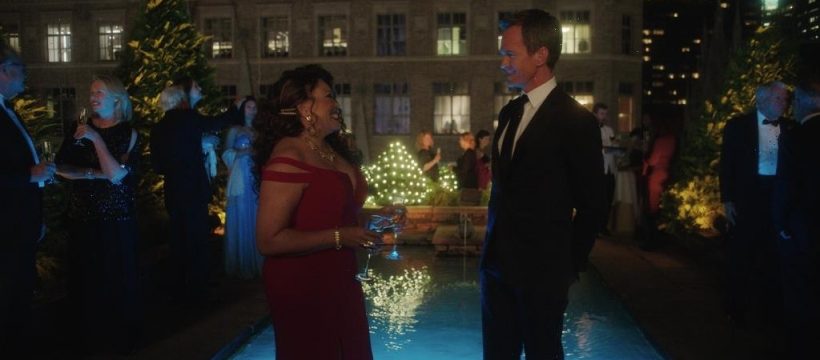Darren Star has, in recent years, had a Netflix success with “Emily in Paris” — a show that, depending on your vantage point, is either a death knell for TV comedy or a sunnily surface-level jaunt whose idle pleasures are just that. Star, the creator of “Sex and the City” and “Melrose Place,” has a gift for skating the viewer across smoothly luxurious settings.
Which may be the problem, or one of them, with his latest series for Netflix, which he created with Jeffrey Richman. “Uncoupled” features Neil Patrick Harris as Michael Lawson, an haute-Manhattan real-estate agent whose long-term relationship, to a character played by Tuc Watkins, falls apart before Michael even knows it’s broken. Michael is forced to carry on with work and to begin to date, all while pretending he’s not devastated. The trouble is that the show comes to seem distracted by all the pleasures surrounding the challenging character of Michael, refusing to stay still and deliver much of any insight about what a midlife breakup might look like, or mean, for a man who’s been in a monogamous relationship for 17 years. The show thrusts its jitteringly antic “Emily in Paris” energy against a subject, and a character, too lachrymose to generate sparks.
Michael’s professional life is largely devoted to finding the perfect home for a society doyenne played by Marcia Gay Harden, assisted by his colleague played by Tisha Campbell. Both Harden and Campbell are very funny performers here, but both struggle to play off of Harris, who has made the decision to play Michael as not just sad and grieving but sour and peeved. What’s happened to him is clearly upsetting, but Harris’ performance whittles down audience sympathy over time. There’s little that is light or fleet in this character, which makes the show’s constant pitching-up of the world around him seem tonally mismatched, or like a compensation.
The idea of a long-term gay relationship ending, and the unchartered nature of what it looks like to be single and eligible in a world that accepts gay people but has pushed them toward marriage, is fertile territory. That’s why it’s disappointing that much of what happens on “Uncoupled” is outright surreal, or close to it. Michael confronts the couples therapist whose ministrations led to his breakup while the mental-health professional is moonlighting as a drag performer; the therapist, in character as “Miss Communication,” curses him out over his “whiny-ass voice” and his narcissism. (It’s an apt critique, coming from a source we struggle to take seriously: What therapist would so wildly attack a former client, whether in character or not?) Elsewhere, Michael’s attempts to re-enter the dating pool are outright catastrophic, with one potential partner attempting to inject him with Botox in a private region of the body; another, a millennial, explains the concept of PrEP, the use of prophylactic medication to prevent the transmission of HIV.
The first couple of these examples feel like the old “Sex and the City” formula, put to misguided use: On that show, the unexpectedness of characters’ — often Samantha’s — encounters made for fodder for conversation about the oddities of human nature, and the unpredictability of the heart. Here, characters exist solely in relation to Michael and his pool of self-regard, as the world around him simply reflects back that he is the only sane man left. (No wonder he’s single!) As for the case of Michael learning about PrEP for the first time (difficult to believe for a connected and worldly gay man living in New York), it’s a cardboard-flat scene that allows him to express disgust at the very concept, lecturing his would-be partner about “where you got your freedoms.”
Everyone can and should make their own choice where matters like PrEP are concerned, but Michael’s instant ratcheting-up of dudgeon reveals the character, once again, as set in his ways and a bit windy in his disgust for those who don’t meet his standards. Harris doesn’t quite let us in on the joke that’s in the script, that Michael is self-aggrandizing to a fault. The generation-gap material here might have given rise to real insight about who Michael is; “Uncoupled” gestures this way when his young date brushes him off, calling him a “bitter old queen.” But then the zazzy music picks up and the scene ends, just as we were getting somewhere. We move to lunch with Michael and two friends (Brooks Ashmanskas and Emerson Brooks), who vaguely address the topic with a few digs and sex jokes, and then the subject changes.
Later, Michael vents that he’s simply not meant to date — he’s meant to be part of the long-term relationship he once enjoyed. Fair enough, but this show is about him trying to date, and his dragging himself through a world he eyes with contempt makes the sparkle and glitter of New York feel less like an asset than like an attempt to distract from the center of the frame. The process of kissing frogs before meeting one’s prince has made for some great fiction, but Michael’s disengagement from this process, his high-handed unwillingness to be part of the story “Uncoupled” is telling in the first place, makes for wearying viewing. “Uncoupled,” by its conclusion, feels like a tour of the city’s luxuries with someone unhappy to be sharing them with you, and an examination of modern life hosted by someone who can’t stop complaining that the past ended. This creates less dramatic tension than audience exhaustion; for all that Emily’s Paris is a frivolous place, at least there, people stop complaining now and again to allow the story to move.
“Uncoupled” premieres all eight episodes on Netflix on Friday, July 29.
Read More About:
Source: Read Full Article
